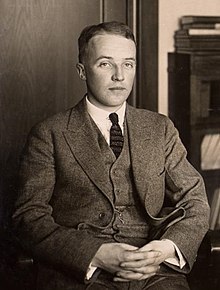Charles Best
Charles Herbert Best , CC (born February 27, 1899 in West Pembroke / Washington County (Maine) , USA , † March 31, 1978 in Toronto , Canada ) was an American-Canadian physiologist and biochemist . Together with Frederick Banting, he is considered to be the co-discoverer of insulin in humans after the Romanian Nicolae Paulescu had recently discovered the effect of this hormone in dogs.
life and work
Born in West Pembroke / Maine in 1899, he studied at the University of Toronto . As a medical student, he began his work with Frederick Grant Banting in 1921, which ultimately led to the Nobel Prize in 1923 . However, the award was given to Frederick Grant Banting and the Scottish physiologist John James Richard Macleod and not to Charles Best, who was essentially involved in the discovery. Banting and MacLeod then each gave half of their rewards to Best and half of their bonuses for cleaning the insulin obtained from pancreatic tissue co-responsible biochemist James Bertram Collip to show their solidarity and appreciation. In 1932 Best was elected a member of the Leopoldina Scholars' Academy , in 1948 in the American Academy of Arts and Sciences and in 1950 in both the National Academy of Sciences and the American Philosophical Society . In 1971, Best received a Gairdner Foundation International Award . In 1994 he was posthumously inducted into the Canadian Medical Hall of Fame .
In 1923 the " Banting Best Institute " for medical research was founded at the University of Toronto. Best became a director in 1941 after Banting's death. There he mainly worked on specialist areas of muscle and sports physiology as well as carbohydrate metabolism and was significantly involved in many individual discoveries. Among other things, he was also a pioneer in the use of agents against thrombosis by providing Irving S. Wright in 1938 with heparin , which he was one of the first to isolate, for the first clinical therapy.
He himself suffered from diabetes mellitus at an advanced age and died at the age of 79 as one of the most important Canadian researchers of the 20th century.
At the University of Toronto there has been a Charles H. Best Lectureship and Award in his honor since 1995 .
literature
- Thomas Schlich: Best, Charles Herbert. In: Werner E. Gerabek , Bernhard D. Haage, Gundolf Keil , Wolfgang Wegner (eds.): Enzyklopädie Medizingeschichte. De Gruyter, Berlin / New York 2005, ISBN 3-11-015714-4 , p. 172.
Web links
- Literature by and about Charles Best in the catalog of the German National Library
- Charles Best ( English, French ) In: The Canadian Encyclopedia .
Individual evidence
- ↑ Book of Members 1780 – present, Chapter B. (PDF; 1.2 MB) In: American Academy of Arts and Sciences (amacad.org). Retrieved November 29, 2017 .
- ↑ Member History: Charles H. Best. American Philosophical Society, accessed May 2, 2018 .
- ^ Charles H. Best Lectureship and Award. In: physiology.utoronto.ca. Retrieved November 29, 2017 .
| personal data | |
|---|---|
| SURNAME | Best, Charles |
| ALTERNATIVE NAMES | Best, Charles Herbert (full name) |
| BRIEF DESCRIPTION | Canadian physiologist and biochemist |
| DATE OF BIRTH | February 27, 1899 |
| PLACE OF BIRTH | West Pembroke , Maine , USA |
| DATE OF DEATH | March 31, 1978 |
| Place of death | Toronto , Canada |
